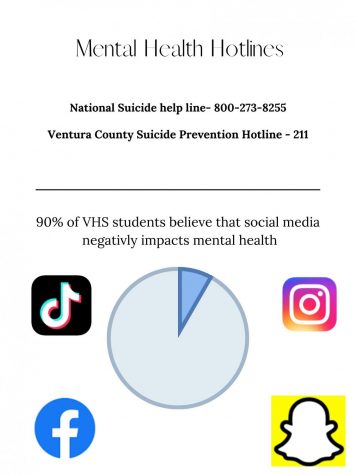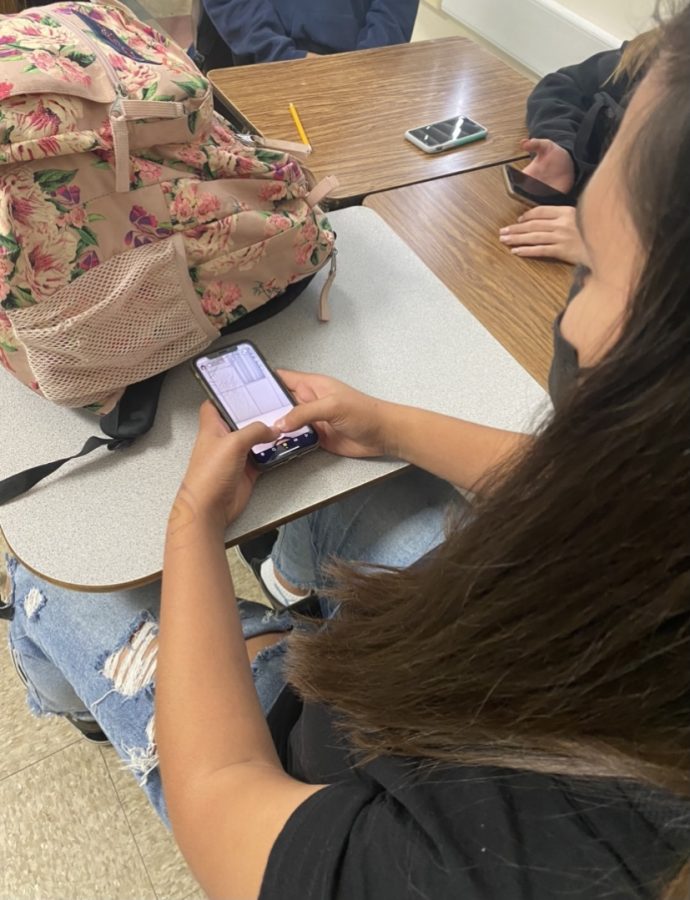Is social media rotting us from within?
Freshman Isabella Brito hiding her Snapchat behind her backpack in Mr. Biller’s third period math class. Photo by: Brody Daw
November 12, 2021
According to VHS students, negative mental health is a result of the drastic impact of social media
“TV will rot your brain.” Many have heard this quote, but does it actually, and is it the same with all of our devices? Studies have shown that mental health is linked closely to the internet and social media. 45 percent of Generation Z reports that their mental health is sound. This is 11 percent less than any other generation. Has growing up in a world of gun violence, politics, climate change and social media impacted the standards that we hold ourselves to?
With the internet at the fingertips of this young generation, access to devastating worldwide events, conflicting and violent information and photoshopped or unreachable beauty standards feeding into “comparison culture” has raised suicide rates for teenagers by 56 percent from 2007 to 2017. However the pushback continues, whether this is because of social media. For many students, their socials are a way to connect and interact with the world from inside their home.
Freshman Abby Strong said, “I do agree that social media impacts mental health, but there is no way I could ever delete my socials.”
Sex, race and ethnicity are factors that can contribute to suicide, depression, anxiety and other mental illnesses, but social media has also taken lives. Suicides drastically rose in 2011, coincidentally, the same time social media began gaining popularity. One in three teenagers living in the United States show symptoms of mental health issues in a given year, one in six kids reported having a suicide plan in 2019. Statistics like these vividly portray a growing problem with the struggle of mental health. 90 percent of students that voted in an Instagram poll for The Cougar Press, on Oct. 22 said that they believed social media negatively impacts mental health.
Bobby Richards, the Student Assistant Program Counselor at Ventura High, said, “Social media has played a big part in student’s mental health and the declining thereof.” She said we have to learn to love ourselves, not compare who we are to the people we see online because so much of that is fake.
Barriers to mental health care have held back progress to fully accepting mental health. When asked about why this is happening, Richards said, “There are many cultures that may not have experienced or dealt with mental health issues, they are just trying to live life, and back in the day, it was not something people could see.” For example, if someone were having a bad day, year, or life, it would be stated. Labels like depression, bipolar disorder and anxiety either did not exist or were not acknowledged. Although society has come a long way from mental health being wholly ignored or stigmatized, there is a long way to go until there are the proper resources to adequately care for all who suffer from mental issues. That includes being careful of prescribing prescription drugs that unknowingly could lead to drug abuse and addiction.

When asked if Richards could speculate why LGBTQIA+ youth are at a higher risk for depression, anxiety and suicide, she said, “Our society has given such a hard blow in how we accept anyone in the LGBTQIA+ community. I could imagine it being a difficult thing even to come out, especially if their parents do not accept who they are.” Microaggressions such as bias, deadnaming and discrimination can lead to suicide, self-harm or mental illnesses. Youth who identify somewhere within the LGBTQIA+ community attempt to commit suicide two to seven times more than their heterosexual and cisgender peers. “I can see how students could hold that in. If they do not feel like they have a voice or place, they feel comfortable sharing who they are as individuals,” Richard said.
Schools need to support the students who are struggling, and for the most part, Ventura has. SAP Counselors are available to talk throughout the school day, and starting after fall break; there will be small groups for stress, depression, etc. However, VUSD has blocked keywords on school Chromebooks such as depression, anxiety, panic attack, suicide, etc. Baffled, Richards said, “I have never heard of that before. The adults may hear a rise in students talking about it or see it to the point that they may be concerned. Nevertheless, the flip side of that is not concerned enough to make that information available to the students who may want to learn if that is what they are experiencing.”
COVID-19’s impact on mental health has been massive. Youth from everywhere have been experiencing an increase in mental issues. Professionals speculate that this is due to the crushing isolation of staying inside and the overwhelming worldwide disasters. VHS students seem to agree, 83 percent answering a poll put up on @the.cougar.press Instagram, on Oct. 22 that COVID-19 has greatly impacted their mental health.
Social media, friend or foe? This has been repetitively debated, is it damaging to teenagers’ self-esteem to have Instagram and Snapchat? Or does the knowledge obtained and the interactions with others online outweigh the adverse effects? Frances Haugen, an ex-employee of Facebook recently exposed them and Mark Zuckkerberg with his overwhelming desire to make money, profiting off of teenage girls who’s mental health is struggling. “Facebook’s own research says it is not just the Instagram is dangerous for teenagers, that it harms teenagers, it’s that it is distinctly worse than other forms of social media. Richard shared her insightful thoughts. “Social media is not real as far as much information that is put out there. For a student to see something, then compare themselves to it and find themselves lacking, they also find that they are not worth being. Richard said, “I do not care if nobody else thinks so. You are worth it. You deserve it.”








![Lindsay Guzik, new assistant principal said, "I am settling in [at VHS] pretty well. I know a lot of the students, so that makes it a little bit easier coming from Cabrillo, and it's been nice to see them all grown up." Photo by: Abraham Kassa](https://thecougarpress.org/wp-content/uploads/2025/09/IMG_9728-300x200.jpg)
